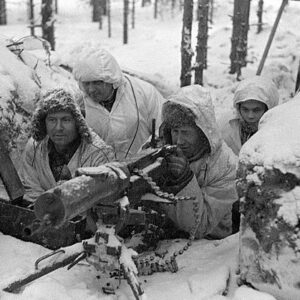Next month will mark the 83rd anniversary of Russia’s attack on Finland in November 1939, when the Soviet Goliath pounced on the neighboring David. It started a conflict that became one of the most intensely brutal engagements of the Second World War, much of it in temperatures 30 degrees below zero.
The Finns’ resistance to Soviet forces soon became an enduring source of admiration for the rest of the world, in no small way boosted by the brilliant first-hand reporting of the Vermont-born writer Virginia Cowles whose war memoirs “Looking for Trouble” was an instant success in 1941.
She was already seasoned professionally by the time she arrived in Finland’s frozen hell having covered (at a mere 26 years old) both sides of the Spanish Civil War. There she became a friend and colleague of such journalism luminaries as Martha Gellhorn and Lee Miller and a rather standoffish Ernest Hemingway. She also came across a Times of London correspondent named Kim Philby. Along the way she was on nodding terms with Hitler in Munich, had a one-on-one interview with a lounge-suited Mussolini, and was a dinner guest of Churchill.
She quickly developed an almost psychic ability as a reporter to be in the right place at the right time.
Cowles witnessed the fall of France, the Battle of Britain, and survived the London Blitz. But it was her experience of the northern warfare which left her most traumatic recollections.
Above the Arctic Circle at minus 32 degrees, considered moderate by the locals, “I wore a skiing suit, a windbreaker, a sheepskin coat, eight sweaters, four pairs of socks, two pairs of gloves and somehow survived,” she writes.
A classic of its kind, “Looking for Trouble” has now been reissued. Reading it today, it is striking how many elements of the Winter War are being replayed today in Ukraine.
First – and obviously – is the size disparity between the combatants and Russian reliance on strategic weight rather than skills. While dodging bombs and bullets, Cowles chronicled gross ineptitudes in Stalin’s high command (“extraordinary stupidity”, she wrote) and untrained, frightened recruits fighting with poor equipment in an environment that also exposed serious limitations on tank warfare.
As with Ukraine, Moscow began hostilities against the Finns on the mistaken assumption they would be quickly overwhelmed – indeed, that the Finns would even welcome the invaders.
The reporter sent harrowing accounts to the London Sunday Times of attacks on non-military targets in which she admitted the difficulty in conveying a picture of what war against the civilian population is like. Cowles quickly understood that the greater the harshness of an invader, the more obstinate their victims became. That was resoundingly true in Finland’s case.
The Winter War lasted only 105 days and is often overlooked because it was relatively small compared to what was to come later and elsewhere in World War ll. Although Finland permanently lost Eastern territory in the peace settlement, the nation was never occupied and post-war stayed outside the Iron Curtain.
In describing the Finns’ “political stamina” against the sweep of Russian power, her remarks might resonate for Ukrainians today who are struggling to hold their homeland against a Russian incursion.
Cowles wrote, “I think it was due first to a free people fighting, with a courage never surpassed, against an Asiatic despotism for their homes, their liberties and their lives; second, to the brilliant strategy of the Finnish military leaders; third, to the natural obstacles of the terrain…; fourth, to Soviet blunders.”
In the immediate future, however, Ukraine’s “fighting season” will soon become winter. Already fields have become muddy, difficult terrain for heavy equipment, and these treacherous conditions could yield to snow. That will oblige a change of tactics in the field and yet more “political stamina” among civilians, experts say.
Cowles witnessed the forerunner of Ukraine’s current agony.
In peacetime, after all her narrow escapes, she raised a family, wrote biographies, and died prosaically in a French auto accident aged 73.

